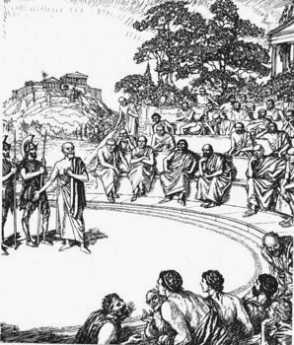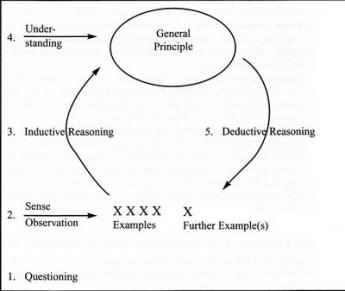Related Topics
Thinking About Thought
There's a yawning gap between concepts of the mind, and concepts of brain function.
Socratic Teaching
It's been sixty-three years since I last sat in a classroom as a student. For an additional fifty-five years, I was a teacher; in the absence of any correspondence to the contrary, I believe I am still listed on the faculty of two medical schools. Socratic teaching is now nearly universal, but I only got a smattering of it as a student. I hated it then, and I grumble about it, still. Just about the only thing I remember about my experience in fourth grade is the following question by the teacher: "Argentina grows wheat. Now, class, what does Argentina grow?" I refused to answer such a question.
It would be another ten years before I had a chance to read some Socratic dialogues, finally recognizing that many of the questions Socrates asked of his students were sarcastic, and even a few of his answers were mocking. After all, Socrates was judged a rebel and executed for promoting subversive thoughts among young and therefore impressionable students. The dialogues are not demonstrations of how to teach a class, they are semi-theatrical depictions of Plato's recollections of Socrates, heavily edited for the purpose of defending his reputation. The main modern criticism of Socrates is not that he made students squirm, but that he relied so exclusively on logic and reasoning. The truth of his teaching was based on plausibility, not testing and proof. Such pontification today would be viewed with skepticism; at most, it would be described as relying too heavily upon secondary sources, because there could certainly be no reference to primary ones. How would I know what Argentina grows? Or, for that matter, how do you know? One really has to pity that poor tormented teacher.

|
| Method |
One has less sympathy with current medical school faculties of New York City, who have largely taken up a denatured version of what they imagine was the Socratic Method, and which their students openly refer to as teaching by coercion. One swaggering professor ended his dialogue with one of my classmates, who in fact later won the Nobel Prize in Medicine, with the finale, "You won't forget that, will you?" To which the future Nobel laureate replied, "Sir, I won't forget you." And another somewhat less distinguished classmate was cringed beside the locked door of the examination room, studying notes right up to the last moment before a final exam. "Well, Levy," boomed the same professor, "Do you know everything about Rheumatic Fever?" To which was made the immortal response, "Sir, no one knows everything about rheumatic fever." By the time they get to be seniors, medical students are famously independent-minded, and they can give back as good as they get. So, one pities that professor less than that fourth-grade teacher, but questions the methodology more. One other mocking description the irreverent medical students give of it is: "Well, what am I thinking, today?"
Let's change the scene to cable television, to a continuous live presentation of current history called C-Span. Once a week, some famous teacher from anywhere in the country is depicted giving a real college seminar. One can easily imagine the editor of this program, with essentially unlimited budget, seeking out the best teachers in the best educational system in the world. On the evening in question, one charmingly pert young lady was performing on a topic I now do not recollect; it was, however, perfect Socratic dialogue. No matter how preposterous the answer, no student was ever wrong about anything. Encouraging smiles urged the student to try again, or stand aside for a classmate eager to recite. Like Molly Bloom, the teacher's responses were, "Yes, yes, yes".

|
| Socratic Diagram |
Within a few minutes, two seemingly unrelated mysteries got clarified somewhat. A possible explanation of the self-assurance of the "x" generation began to suggest itself. Those children of silent, withdrawn parents had been encouraged to believe their spontaneous instincts were oracular, as a way of encouraging the shy to assert themselves. Ten or twelve years of Socratic, "Yes, yes, yes" had half-convinced a sizable minority that their views were those of unsullied vestals, clearly to be preferred to those who relied on that famously undependable source, experience. It can take four or five years to recover. And watching TV another mystery seemed to expose some of its roots. For some years I have marveled at the manner of academics in charge of a meeting of peers. Ever since Thomas Jefferson presided over the unruly Senate at Sixth Street in Philadelphia, the Parliamentary rules have been strict: the chairman only votes to break a tie, and absolutely never engages in partisan debate. Yet repeatedly one watches these lovely people, often close friends, riding rough-shod over colleagues in a debate. Suddenly while watching TV focus on the best of them, some glimmering of understanding begins to emerge. The teacher states the proposition, asks the question of the audience, and hunts for someone to give the right answer. If the question is amended, it is referred to a committee which will think about it. If someone voices the right answer, it is cheered as having closed the topic to further discussion. Very few votes are ever taken.
It's impossible to crawl inside the heads of people, even your friends, and pick out their motives. But now, the Socratic skeptics at least have some idea where all this is coming from.
Originally published: Tuesday, July 12, 2011; most-recently modified: Wednesday, June 05, 2019